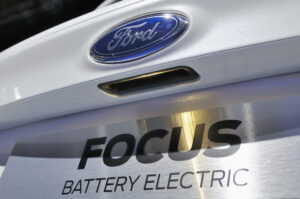
Ford seeing EV losses up to $100,000 per vehicle; Arizona Republicans file suit against EPA
By onLegal | Market Trends
Ford Motor Co. is cutting orders from battery supplies as the company is seeing losses up to $100,000 per electric vehicle (EV), sources have told Bloomberg.
“The move is part of a retrenchment of Ford’s EV strategy, which includes reducing spending by $12 billion on battery-powered models, delaying new EVs, cutting prices, and postponing and shrinking planned battery plants,” the Bloomberg article says. “Ford has forecast EV losses of up to $5.5 billion this year and Chief Executive Officer Jim Farley recently said its EV unit, Model e, ‘is the main drag on the whole company right now.'”
Bloomberg says Ford’s EV losses have more than doubled its deficit from last year. It also says losses sustained from EVs this year could nearly wipe out the profits earned from the Ford Blue division, which makes traditional internal combustion engine vehicles and gas-electric hybrids.
“The reduction in orders is a fresh sign of the headaches plaguing the industry,” the article says. “Automakers in the US are confronting EV demand that continues to fall short of expectations. Meanwhile, battery makers in South Korea, China, and elsewhere are dealing with a backlog of unsold inventory.”
President Joe Biden recently announced 100% tariffs on Chinese electric vehicles (EVs) in an attempt to keep China from dominating the industry.
According to MSN, manufacturers are also concerned by EV production in China, specifically a Build Your Dreams (BYD) vehicle named the Seagull.
The tiny EV sells for about $12,000 in China, drives well, and is well manufactured, MSN says. A shorter-range version of the vehicle costs less than $10,000.
BYD has said it doesn’t plan to import to the United States any time soon, according to multiple media reports. MSN adds that the cost of U.S. tariffs is one reason that likely keeps the company from doing so. Chinese vehicles already have a 25% tariff, according to an AP article.
However, MSN says the Chinese EV market still has the potential to shake up the auto industry in the same way Japan did in the 1970s.
Yet, the Biden Administration has marched forward with EV plans, and the EPA released new standards to reduce carbon emissions in April.
The plan doesn’t require manufacturers to produce EVs to meet the standards, but it is likely the easiest way for them to meet the standards that start in 2027.
Arizona State President Warren Peterson, Arizona House Speaker Ben Toma, and Arizona Trucking Association recently filed two lawsuits against the EPA over the standards, calling them a massive federal government overreach in a press release.
One of the filings claims the EPA’s final rule exceeds its authority and is arbitrary capricious, an abuse of discretion, and otherwise not in accordance with law.
“The regulations are anticipated to detrimentally transform our nation’s entire automotive industry and cost billions of dollars to implement,” the release says. “The rules require by 2032 nearly 70% of all new vehicles and 25% of all new semi-trucks or similar heavy-duty vehicles sold in the United States to be electric, guaranteeing to raise the costs of everything Arizonans purchase, and without adequate charging infrastructure in place or the necessary power grid capacity.”
Earlier this month, U.S. senators and representatives introduced legislation in the Senate and House to block the EPA regulations.
The bills, introduced by U.S. Sens. Dan Sullivan (R-Alaska) and Pete Ricketts (R-Nebraska), and U.S. Reps. John James (R-Michigan-10) and Russ Fulcher (R-Idaho-01), announced the filing of Congressional Review Act resolutions, which allows Congress to overturn final rules issued by federal agencies.
The National Federation of Independent Business issued a release saying it supports legislation aimed at stopping the EV mandate.
It said 96% of respondents in a member ball0t expressed their belief that the federal government should not restrict purchasing consumer products like gas-powered vehicles.
IMAGES
Photo Courtesy of Sjo/iStock
